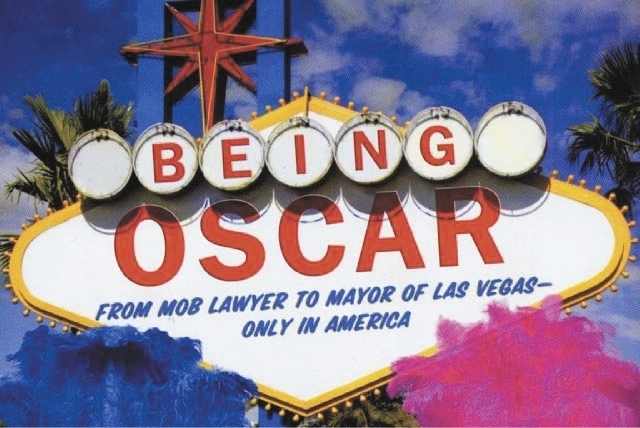Tales about Las Vegas make good stocking stuffers
Las Vegas is a land of big talkers and bigger dreamers, a place where some players make big scores and others lose it all.
At least, that’s what I read.
There are cities with greater literary traditions, but you’ll have to look far to find one with more colorful characters. Three books published this year illustrate that truth.
First up is the memoir of everyone’s happiest ex-mayor, the reinvented mob attorney Oscar Goodman, “Being Oscar.” Written with veteran author and organized crime specialist George Anastasia, “Being Oscar” captures Goodman’s voice and trademark irreverence. As ever when it comes to Goodman, the laughs come at some truly strange moments.
Defending killers and con men might have been dangerous work, but it certainly didn’t dampen Goodman’s sense of humor.
If it isn’t a vehicle for an HBO series or Broadway musical, it ought to be.
Next is “Son of a Gambling Man,” former Nevada Gov. Bob Miller’s memoir of growing up in the house of old-school casino boss Ross Miller. It was no “Father Knows Best” scenario. Ross Miller was a tough guy, and at times his son renders poignant memories of his youth.
Although Miller scored a remarkable record of success during his long political career, my favorite parts of the book come when the Silver State’s 2½-term governor reminisces about golden-age Las Vegas.
Then there’s David G. Schwartz’s well-researched biography, “Grandissimo: How Jay Sarno Won a Casino Empire, Lost It, and Inspired Modern Las Vegas.”
In a casino industry bursting with praise for its current ringmasters, Steve Wynn, Sheldon Adelson, Gary Loveman, and Jim Murren among them, it’s possible to forget that it was Sarno who dreamed biggest of all at a time the gambling racket wasn’t exactly for the weak-kneed.
Sarno was a big-idea man with a gift of hustle and a willingness to play in a street riddled with mobsters and pension fund scammers. Although he fell short of accomplishing his greatest vision, The Grandissimo, Sarno is the rotund creative force behind Caesars Palace and Circus Circus.
“Sometimes, the city loses sight of Jay, but at times of crisis, it comes back to him,” Schwartz writes. “Scrambling to redefine itself in the post-9/11 gloom, an ad writer with R&R Partners created a slogan, ‘What Happens Here, Stays Here,’ that launched a series of ads for the Las Vegas Convention and Visitors Authority. The new Las Vegas, with nightclubs, celebrity chefs, world-class shopping, and five-diamond suites, wasn’t about the mundane; it was a release from a threatening world, an oasis of 24/7 freedom. It was a message people wanted to hear, and they flocked back to Las Vegas.”
If the author at times gives too much credit to his subject, he’s forgiven. Thanks to Schwartz’s efforts, the grand casino ringmaster Jay Sarno will long be remembered.
Although space limitations will make it appear I’m giving these titles by Las Vegas authors short shrift, they are well-worth your reading time. (And if you hurry, you can read them and still slip them into a Christmas stocking.)
Try novelist Richard Wiley’s latest, “The Book of Important Moments,” a collection of short fiction that shows his versatility. He is a remarkable storyteller. Wiley is also a longtime UNLV English professor and an Associate Director of the Black Mountain Institute.
For a short read about the metaphorical properties of Las Vegas, there’s “Getting Better All the Time: Las Vegas Writers Explore Progress” from Huntington Press. Edited by Scott Dickensheets, it includes the work of several gifted local scribes, including the Review-Journal’s own Henry Brean, on the subject of the future in a place where anything seems possible.
And I can’t forget the latest edition of true crime writer Cathy Scott’s “Murder of a Mafia Daughter,” which traces the life and final days of Susan Berman, who was not only a talented writer but also was the only child of old-school casino man Dave Berman.
After reviewing the work of these talented writers, I just hope there are still a few stories left to tell in 2014.
John L. Smith’s column appears Sunday, Tuesday, Wednesday and Friday. E-mail him at jsmith@reviewjournal.com or call (702) 383-0295.














